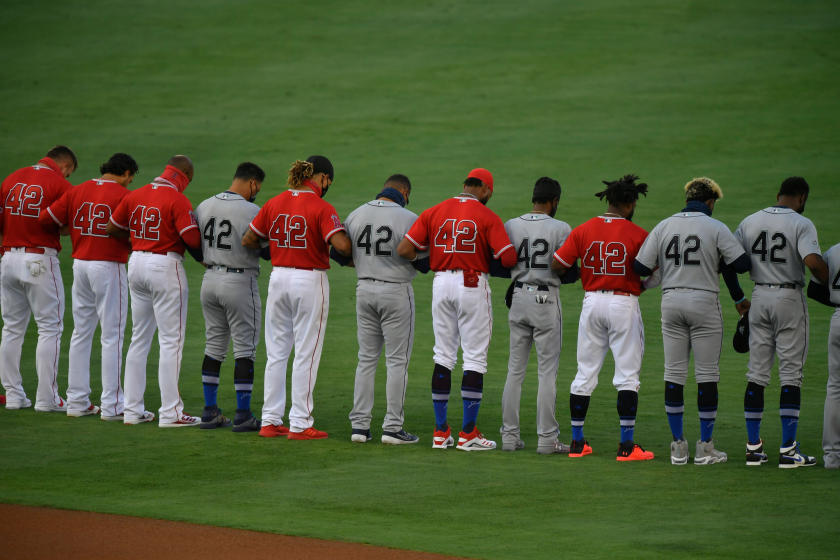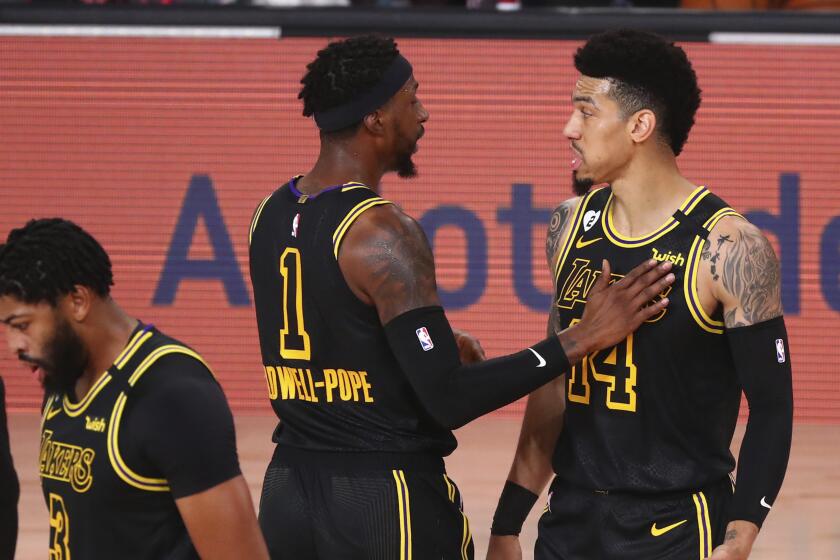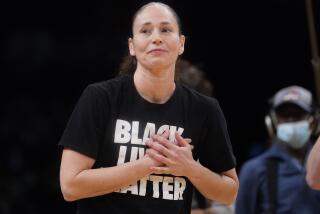Athletes find the power of their collective voice in Jacob Blake protests
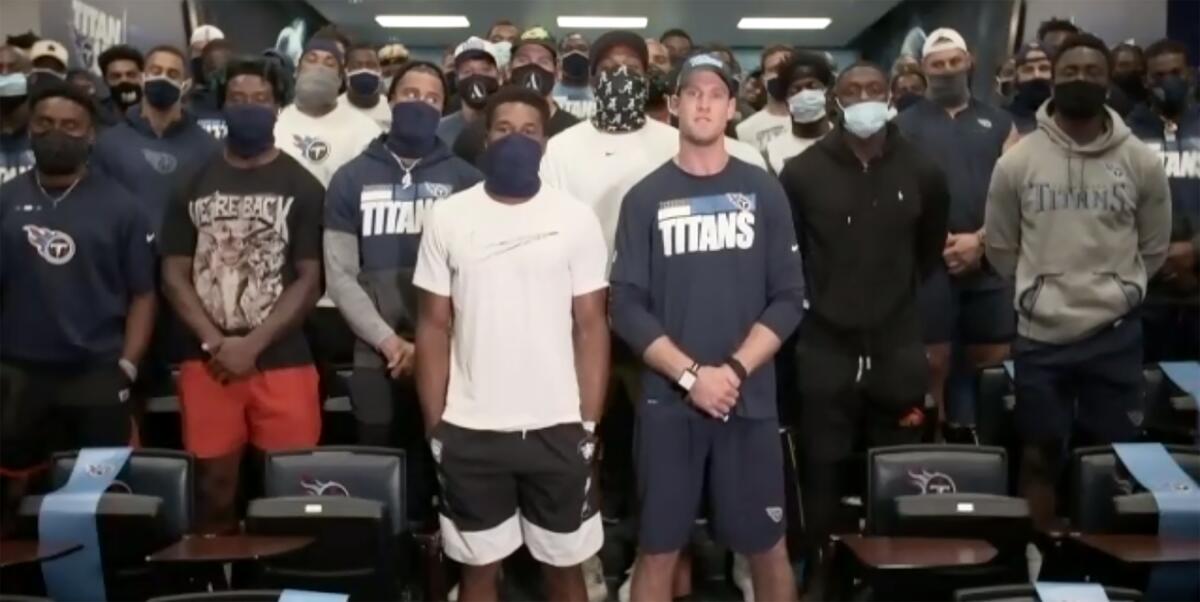
- Share via
When Colin Kaepernick took a knee during the national anthem, critics labeled him unpatriotic. When LeBron James talked politics, a television news host told him to “shut up and dribble.”
This time feels different.
The wave of athlete walkouts last week, sparked by the police shooting in Kenosha, Wis., of Jacob Blake, a 29-year-old Black man, could not be as easily dismissed because it wasn’t only one or two voices speaking out.
This time, when the Milwaukee Bucks decided to sit out an NBA playoff game, their protest swept quickly through the league and across all of sport, forcing postponements in baseball, soccer, hockey and tennis.
There was some pushback, most notably from President Trump, who said the NBA had become “like a political organization and that’s not a good thing. I don’t think that’s a good thing for sports or for the country.” Such dissent was largely drowned out by support from league officials, team owners and fans.
To say the walkouts represented an evolution, the next step in a history of athlete activism — like Muhammad Ali refusing to report for military induction or Tommie Smith and John Carlos raising their fists on the Olympic podium — doesn’t quite suffice.
The players this time had the same moral conviction, the same desire for social change, with the addition of something more — a confluence of circumstances and opportunities their predecessors never had. They just needed the confidence to act.
“When you have a whole team that decides not to play, and other teams follow suit, it’s on a much different level,” said Todd Boyd, a USC professor of race and pop culture. “This is new territory.”
::
Sometimes sports lead the way, such as when Jackie Robinson broke baseball’s color barrier in 1947, years before the civil rights movement. Other times, sports merely reflect society.
Players on the Angels and Seattle Mariners stood together and locked arms during the national anthem before the Angels’ 3-2 victory at Angel Stadium.
Ali’s refusal to go to Vietnam in 1967 was bolstered by the anti-war movement. This summer, player walkouts were preceded by nationwide protest over the deaths of George Floyd, Breonna Taylor, Ahmaud Arbery and others.
A majority of Americans have come to see racism as a problem, according to polls that have detected another shift in attitude — more people believe it is appropriate for athletes to protest by kneeling during the anthem.
“When you think about it, at what moment does your protest happen?” said Dan Lebowitz, executive director of the Center for the Study of Sport in Society at Northeastern University. “What is the social evolution temperature of the country or the world?”
NBA players, in particular, had questioned the idea of returning to action in a quarantined environment in Orlando, Fla., during this time of national unrest. Their doubts intensified last week as video emerged of a policeman shooting Blake seven times in the back.
“We shouldn’t have even came to this damn place, to be honest,” said Milwaukee Bucks guard George Hill, whose team plays less than an hour north of where Blake was shot. “I think coming here just took all the focal points off what the issues are.”
James put it in more personal terms, saying: “I know people get tired of hearing me say it, but we are scared as Black people in America. Black men, Black women, Black kids, we are terrified.”
After the Bucks refused to take the court Wednesday — abruptly launching the walkout — there were questions about what to do next. Unlike athletes who came before, these players had options.
The 24-hour news cycle afforded them a broader platform to voice their concerns. Social media allowed them to speak directly to fans.
“This [expletive] bigger than basketball,” San Antonio Spurs star DeMar DeRozan tweeted. “Whoever don’t understand that is part of the problem.”
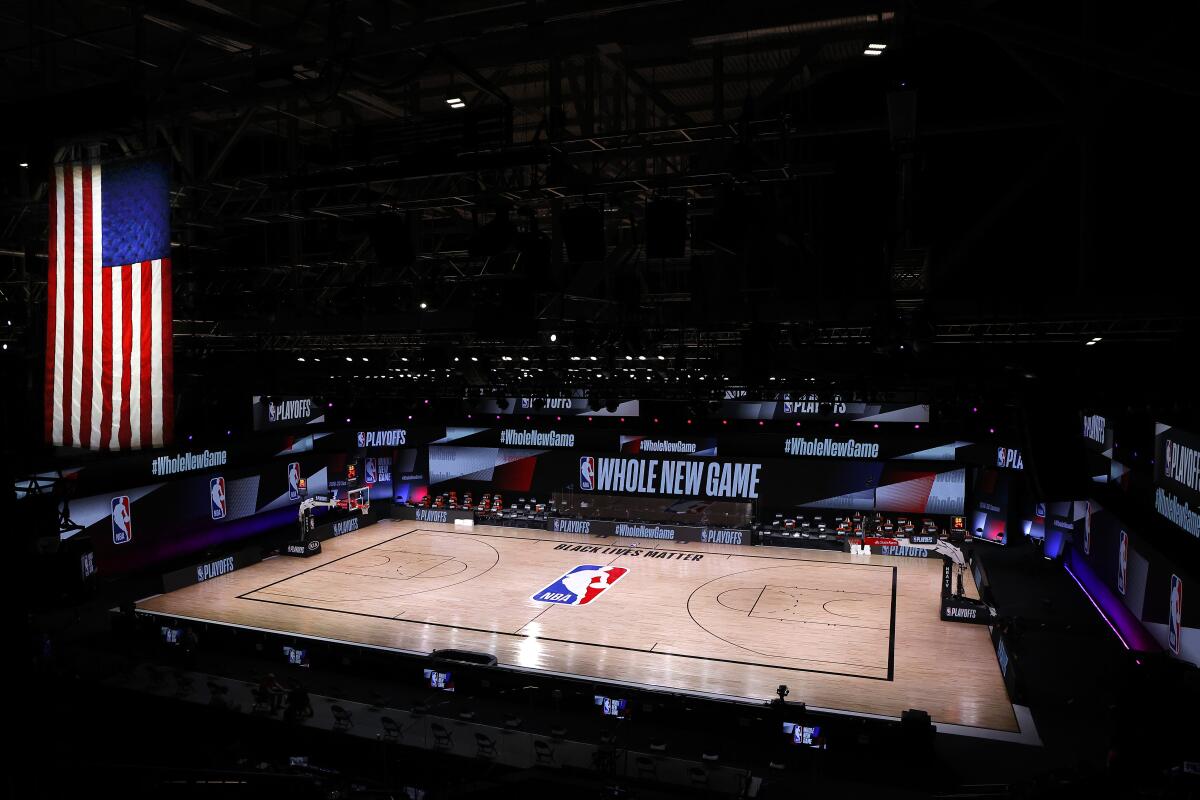
It was a series of text messages with family that persuaded Dodgers outfielder Mookie Betts to sit out a game in San Francisco. His teammates volunteered to join him, as did the Giants. Clayton Kershaw, scheduled to pitch that night, talked about “standing up for what we believe is right.”
As word spread at digital speed, players in the WNBA and Major League Soccer were making similar decisions. The NHL postponed games the following day.
This wasn’t going to be like before, when Ali sacrificed three years in the prime of his boxing career while protesting the war. It wasn’t going to be like Smith and Carlos being shunned by track and field or Kaepernick getting ostracized by the NFL.
Athletes united this time in large enough numbers to shield themselves against reprisal. They had another, unexpected advantage.
By the time the COVID-19 shutdown began to ease, the nation was hungry to watch sports again. Players held the power to snatch the games right back.
“I think what you’re seeing is athletes understand the power of their platform,” Lebowitz said. “Sport is really the ultimate common denominator. Everybody can go and root for the Dodgers or the Lakers on a given day.”
When tennis player Naomi Osaka withdrew from her semifinal match at the Western & Southern Open in New York, officials responded by pausing the whole tournament.
“As a Black woman I feel as though there are much more important matters at hand that need immediate attention, rather than watching me play tennis,” Osaka wrote on social media. “I don’t expect anything drastic to happen with me not playing, but if I can get a conversation started in a majority white sport I consider that a step in the right direction.”
In the span of 48 hours, much of the sports world had ground to halt — like at the start of the pandemic — with both players and fans wondering how long it might last.
::
There was talk among NBA players of skipping the rest of the season. A closed-door meeting Wednesday turned heated at times and social justice was only part of the conversation; these are men with private lives and families back home, and there was a lot of money at stake.
The NBA and players union announced Friday the establishment of a coalition to address a range of social issues, including voter access and criminal justice reform. Players would return to the court.
“We look forward to the resumption of the playoffs and continuing to work together — in Orlando and in all NBA team markets — to push for meaningful and sustainable change,” the league and union said in a joint statement.
Much of what has transpired this summer can be seen as a victory for athletes. They have made their voices heard and established their clout.
As he spoke Friday afternoon, Danny Green was careful to illustrate the many nuances of the previous 48 hours.
It remains to be seen if the walkout will help produce real change, which would require something more than the NBA sticking a “Black Lives Matter” logo on the court or the NHL publicly condemning racism.
“At the end of the day, what are they doing? They’re making a statement or printing a slogan on the court,” Boyd said. “They’re not giving up a kidney. I mean, it’s great, it’s good to see, but it’s not a sacrifice.”
Until the final results are in, the players’ decision to return will be up for debate.
One argument goes like this: If white Americans aren’t willing to change, why should Black men and women help provide them with the sports they crave? This question ties into a traditional theme of “Black artists resisting the idea that they are here to entertain white society,” Boyd said. “They recognize they have a bigger purpose than entertaining the masses.”
Walking away, though, means surrendering their platform. By choosing to play, they stay in front of all those television cameras and microphones.
The last week has witnessed a new template for activism in sport, a game plan that figures to alter the landscape for years to come. Players from every kind of game have discovered that by acting as a collective they can leverage their celebrity for social change.
“Sport is something that, all around the world, we pay attention to,” Lebowitz said. “This is a resounding response to anybody who belittles the athletes and tells them to shut up.’
More to Read
Go beyond the scoreboard
Get the latest on L.A.'s teams in the daily Sports Report newsletter.
You may occasionally receive promotional content from the Los Angeles Times.

